
As Israel is preparing for its Tuesday's snap election, the second within six months, the country's longest-serving Prime Minister Benjamin Netanyahu is also battling for his political future.
Named by his supporters as "King Bibi," Netanyahu has been crowned the Israeli prime minister for 20 years. However this time, he is facing actual rigorous challenges.
Three-star general Benny Gantz from the White and Blue Party is still Netanyahu's strongest rival and Bibi's former aid and current leader of Yisrael Beitenu party, Avigdor Lieberman, is now called as Kingmaker whose moves and stances are unpredictable. Besides, Netanyahu is still carrying three corruption charges cases.
Netanyahu continues to follow his past pattern in the campaign period, threatening for more annexation in occupied West Bank, warning Israeli-Arab voters and making fiery rhetoric against the country's main regional rival, Iran.
Read more:
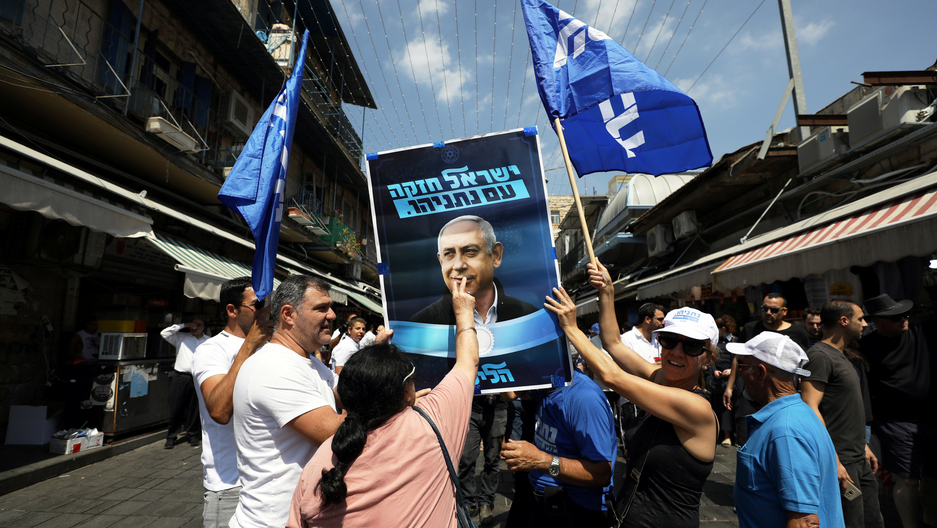
A supporter of the Israeli Likud party kisses an election campaign poster depicting Prime Minister Benjamin Netanyahu at a market in Jerusalem, September. 13, 2019. /Reuters Photo
Why a second election?
Government formation is not an easy job in Israel but it is still the first time the country has two elections in such a short period of time.
In the last election in April, none of the parties won 61 out of 120 seats in the 21st Knesset.
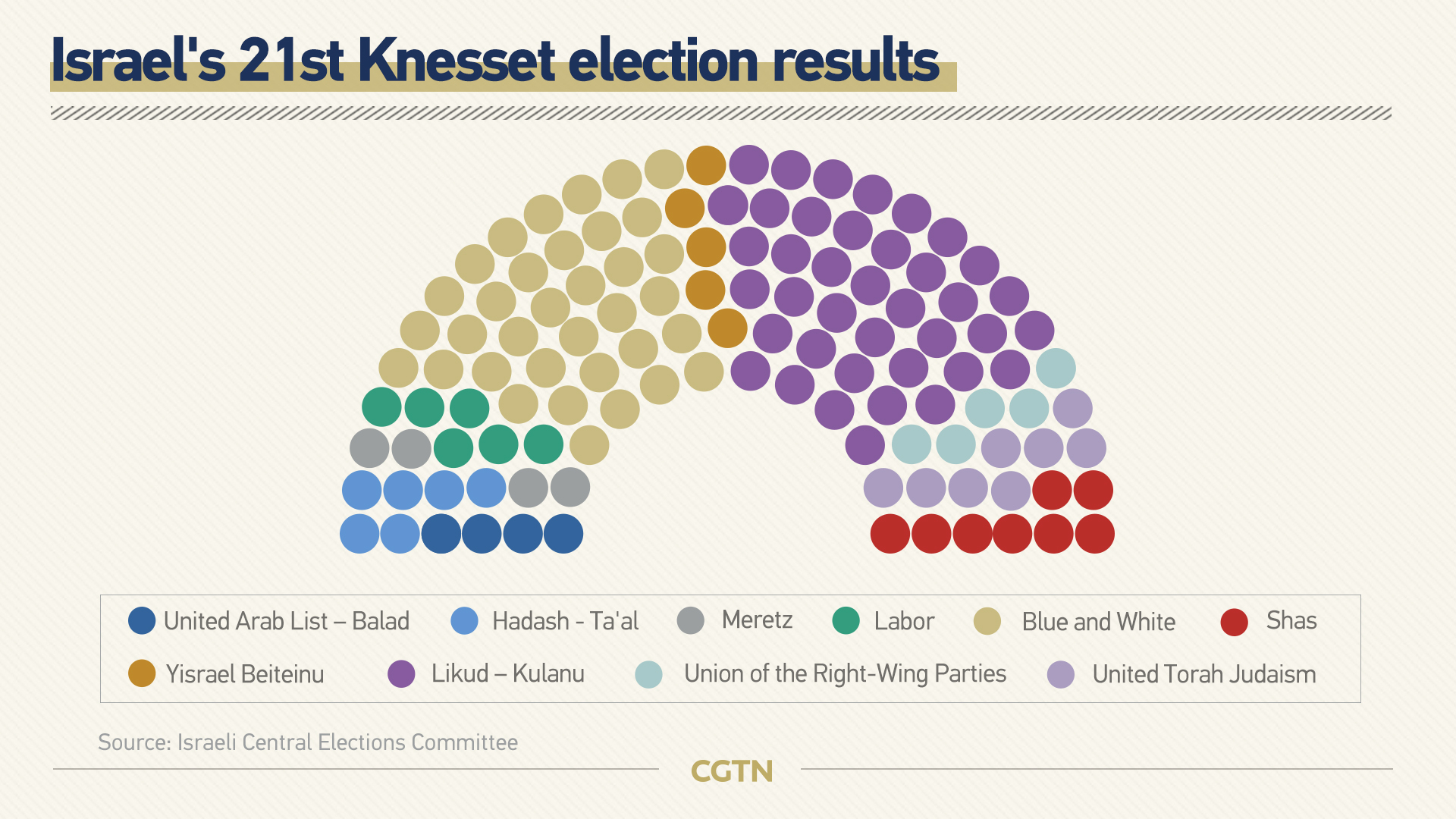
This is not odd as no party has ever won the majority in the Knesset. However, four-time Prime Minister Netanyahu failed to form a government coalition and this is the first time in Israeli history that a prime minister has failed to accomplish that fact.
The right-wing and religious parties are usual coalition allies with Netanyahu's Likud party. Things went wrong last time as nationalist Yisrael Beitenu party clashed with ultra-Orthodox Jewish parties over a military draft bill.
The former defense minister Lieberman made a condition of passing a new bill that forces quotas onto ultra-Orthodox young men to serve in the army for forming a coalition while ultra-Orthodox Jewish parties cannot accept.
As Netanyahu couldn't pull the two sides together, he then called for new elections to prevent Israeli President Reuven Rivlin from giving his rivals the chance to opportunity to form a government.
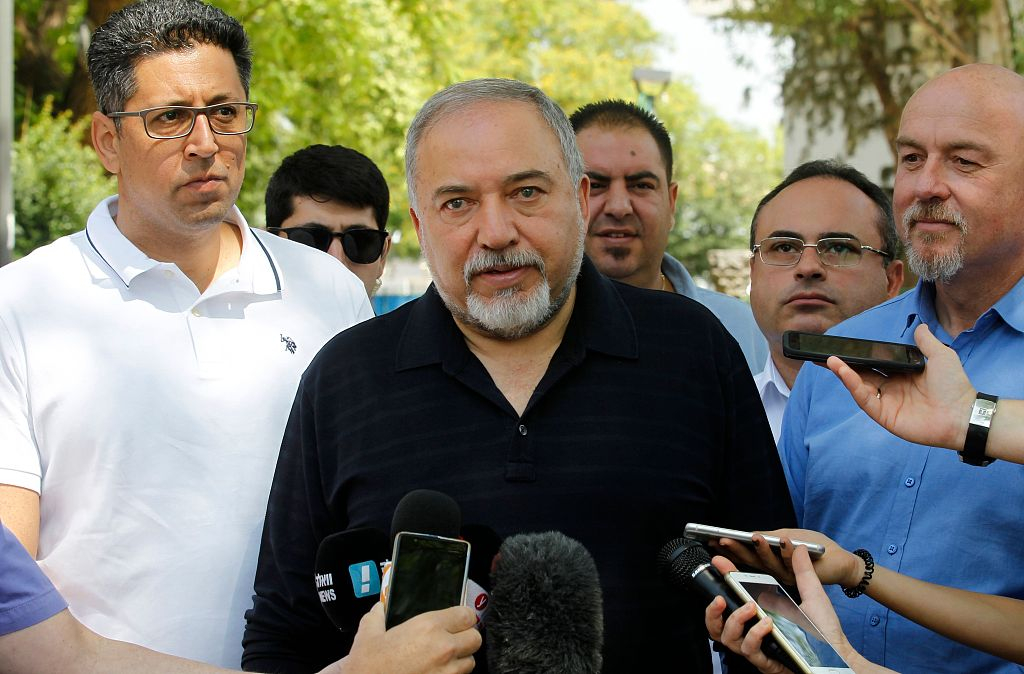
Previous Israeli Defense Minister Avigdor Lieberman (C) speaks to reporters during a visit at the Israeli settlement of Katzrin in the annexed-Golan Heights on May 11, 2018. /VCG Photo
Tough image
With some comments sensing Netanyahu's decade in office may be entering its closing phase, King Bibi is trying to use a tough diplomatic image to survive in the coming elections.
During a weekend in late August, Israel stroke in three different countries: Syria, Iraq, and Lebanon showing Netanyahu's aggressive military posture.
Lebanon, Iraq, and Iran have all declared recent Israeli aggression as "an act of war."
Meanwhile, the recent exchange fire between Israel and Hezbollah at Lebanon border is also the first air combat deep within Lebanon since the July 2006 war between Israel and Hezbollah.
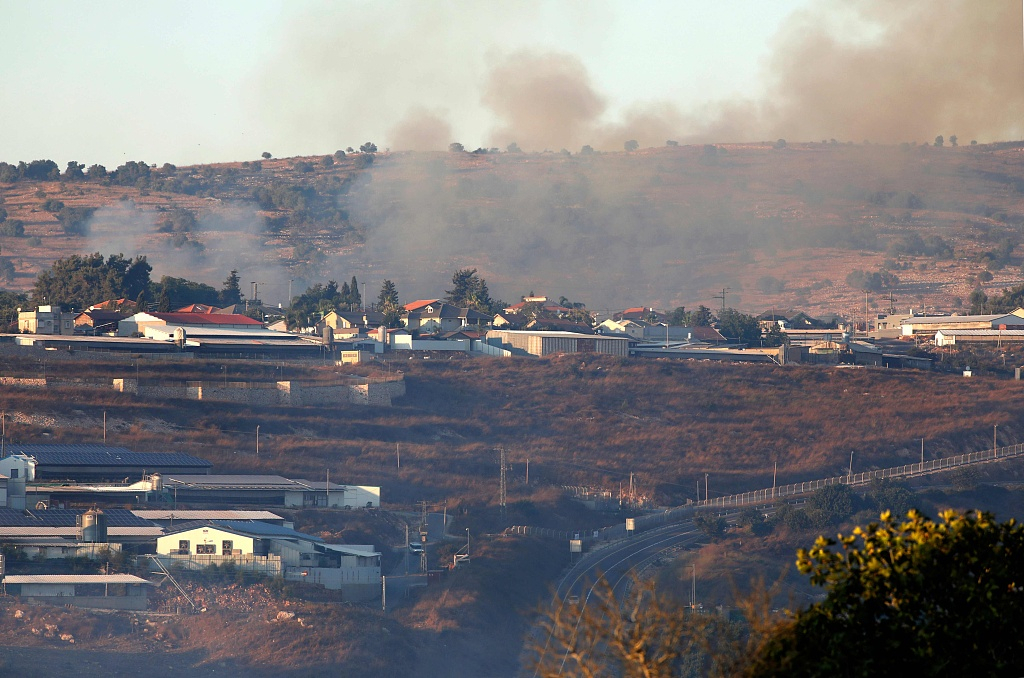
A location near the northern Israeli town of Avivim, close to the border with Lebanon, shows smoke rising following an exchange of fire on September 1, 2019. /VCG Photo
Netanyahu and his wife also made a controversial visit to a flashpoint site in the West Bank city of Hebron, on Tuesday, on what was his first official visit to the city since 1998.
Hebron was seized by Israel in the 1967 Middle East war. Israel has controlled it ever since, an act condemned by the international community.
On Tuesday, the Israeli prime minister also vowed to annex the occupied Jordan Valley in the West Bank if he was re-elected and threatened war in Gaza Thursday. He made similar remarks before the April elections but did not move to implement it.
Gideon Levy, a senior Analyst, Haaretz columnist and a member of the newspaper's editorial board, told CGTN that voters in Gaza only make up a small percentage of the ballots which will not change the political picture in Israel.
He believed Netanyahu's remarks won't help him boost his votes too much and Netanyahu himself also clearly knows that wars are not the solutions to deal with the Gaza situation.
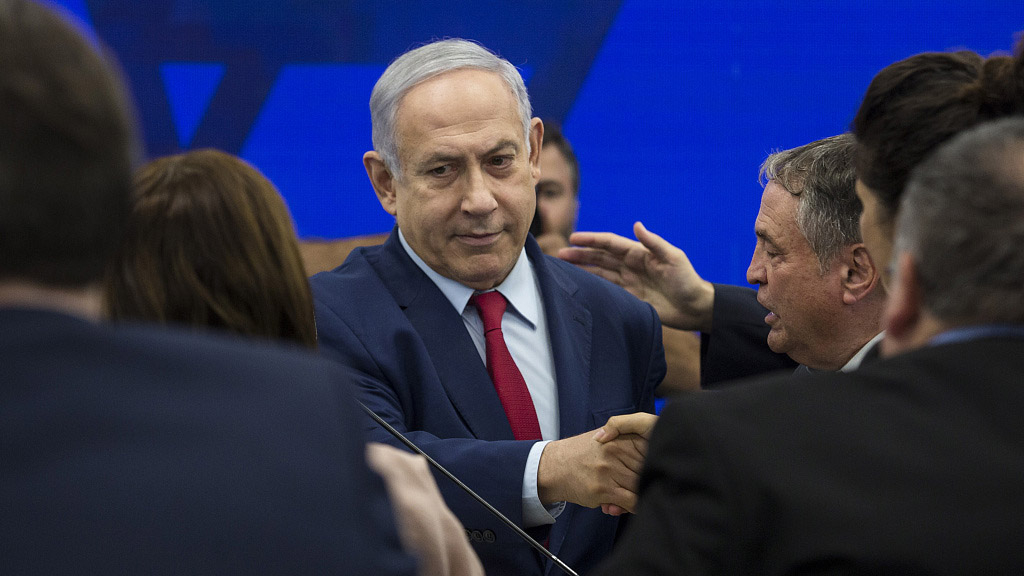
He also has never stopped pressured on Iran. Apart from urging world leaders not to open talks with Iran, last Monday he also accused Iran of having a secret nuclear weapons site which Iran quickly refuted.
Read more:
Israel's Netanyahu faces criticism over annexation plan
Netanyahu says Iran had secret nuclear weapons development site
'Steal the election'
Netanyahu earlier attacked his main rivals: Blue and White leaders Yair Lapid and Gantz for "stealing the election" because of their opposition to the camera bill while Gantz accused the prime minister of "trying to delegitimize the democratic process."
The bill is aimed to allow observers from parties to place cameras inside polling stations. Likud party claimed the initiative aims to avoid voter fraud but criticism said it's an attempt to suppress the Arab vote. Lieberman's Yisrael Beitenu Party also voted against the bill.
Arabs make up 21 percent of Israel's population and they generally won't vote for the Likud.
Although Arab-Israeli parties never sit in Israel governing coalition, this time four Arab-Israeli parties united in a coalition called the Joint List aiming to win more seats in the parliament. Poll shows the number could be around 10 or 11.
Centrist former General Gantz is still Netanyahu's strongest adversary. His Blue and White Party won 35 seats in April's election same as Netanyahu's Likud.
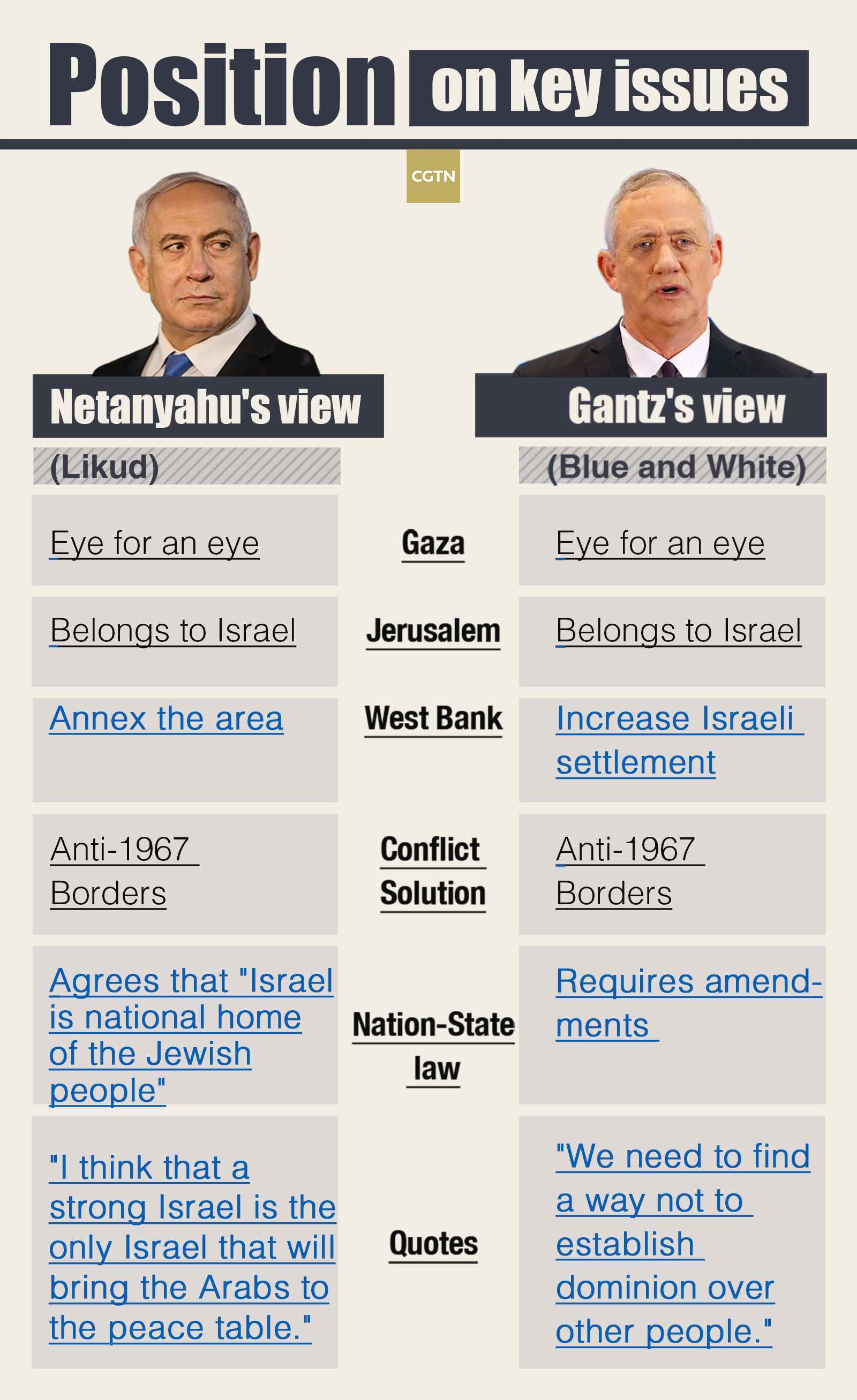
The recent polling data from the Israel Policy Forum showed Likud and Blue and White are still virtually tied and the Blue and White even sometimes surpassed Likud.
No matter who wins more seats, neither Netanyahu nor Gantz would be able to form a coalition government alone. Hence analysts said there is a possibility the two rivals may finally form a unity government to avoid a third election.
Yisrael Beitenu Party's leader Lieberman also proposed to form a "national unity government" which would include his own party, Likud and Blue and White.
Opinion polls indicated that far-right Yisrael Beitenu could double to 10 seats in the Knesset this time so that Lieberman is now seen as a Kingmaker by some analysts who at least are able to decide where he will fit in the coming government coalition.
Corruption scandals could also mean trouble for Netanyahu's re-election path although the hearing won't be held until October.
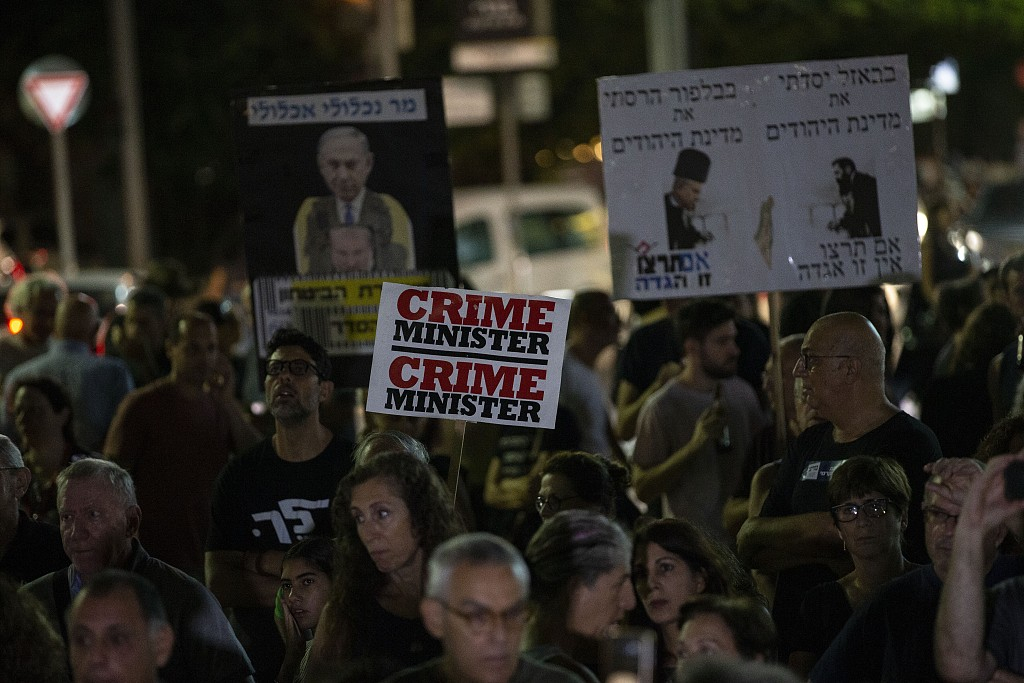
People holds banner aganist Israeli Prime Minister Benjamin Netanyahu when attending a rally of The Democratic Union political party in Tel Aviv, Israel, September 14, 2019. /VCG Photo
Gantz expressed his willingness to teaming up with Likud but he has a precondition: the government won't be lead by Netanyahu. The corruption indictments the prime minister is facing are the reason given for this move.
As the first sitting prime minister to be indicted on criminal charges in Israel, King Bibi is indicated for accepting bribes worth 200,000 U.S. dollars and using his position to improve his media coverage, but he denies any wrongdoings.
(Cover: A Likud party election campaign banner with Russian writing in seen near a road sign in Ashdod, Israel, September 9, 2019. /Reuters Photo)

Copyright © 2018 CGTN. Beijing ICP prepared NO.16065310-3
Copyright © 2018 CGTN. Beijing ICP prepared NO.16065310-3